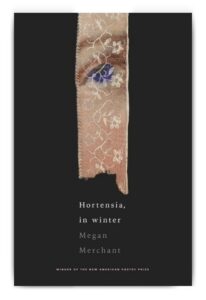 Review by Meghan Miraglia
Review by Meghan Miraglia
“[W]hat comes after the last word”: A review of Hortensia, in winter
The first line of Megan Merchant’s Hortensia, in winter is a damn good one: “I want to ask the hard questions, but they sharpen back to god.”
The line is from “Invocation”, a poem summoning Mississippi ditches and lineage and “bones and chapped prayers” (17) As the best first poems do, “Invocation” sets the tone for the rest of the collection. Hortensia, in winter is a series of prose poems (a form Merchant has mastered), but more than that, it is a mosaic of questions. A collage of becomings and un-becomings. A scrapbook of womanhood, motherhood, wifehood, and sainthood.
One of the “hard questions” Merchant explores is, What did I inherit? The title of the collection, Hortensia, in winter, references Merchant’s ancestor, born on March 30th, 1824. Hortensia settled in Iowa with her husband and son. They were Mormon, but left the church when polygamy was introduced; they followed Joseph Smith’s widow instead.
Many of the poems are epistolary. The poet-speaker talks to Hortensia, sifting through religion and spirituality, marriage, love, loss, art, desire. The poet-speaker reveals so much about herself in these epistles. Take, for instance, “Helpmeet” (19):
To be all things at once while still being yourself – isn’t that the goal? Hortensia, were you given the smallest room in the house of your own life? I am gifted a single window. Winter crammed in the way that only a cat could skuttle through. You are my periscope, the law of reflection at play, these poems – the surface. Teach me how to dismantle desire. The roots of it.
The poet-speaker’s anxiety is palpable – the questions, the emdash interruption, the imploring to “teach me how to dismantle desire” (19). She has inherited “the smallest room in the house” (19). But what about the rest of the house? What about the other rooms?
The poet-speaker continues to question her inheritance. In “Applying for Sainthood,” the speaker catalogues what she was taught about femininity: “A woman’s work…was to endure” (21) and “A woman must remain pure” (22). The thread continues in “Score”: “A good wife, that’s what holy means” (31). It returns in “Portraiture: Nude”: “We are taught to yearn for erasure” (33). The feminine body is relegated to a present-absence, not unlike Hortensia’s ghost, who passes in and out of the poet-speaker’s memory.
There is also a grief for what was not passed down. “Applying for Sainthood” ends with the image of the speaker “slinging a pocket of colored glass at the vultures…My mother never taught me her prayer for that – how to rip it clean, how to boil the bones and make a broth that sustains” (22). In reaching into her past, the poet-speaker finds rift after rift, loose threads in the tapestry that must be re-woven.
Another one of the hard questions is concerned with lineage: What does it mean to “be a good ancestor” (55)? In “Taboo,” the poet-speaker explores descendancy, motherhood and nature against a backdrop of hail, cottonwoods, and “three glasses of screw top wine” (34). She fears forgetting her son’s medication, and “[tries]to remember the last place I’d seen myself” (34). “Taboo” culminates in a stunning image of mercy. The poet-speaker is aware of her agency. Will she pass down weapons of harm, or tools for repair?
After I learn that some female snakes have two clitorises in the shape of a heart, I put the rock down. Hortensia, how could I kill what is capable of deriving pleasure from this life?
It’s not just a matter of killing or not-killing the snake – it is a matter of seeing and nurturing the animal within us that, despite all this (despite the anxiety, despite the long days and short years and the chasm of rocks), still wants. This, too, is a kind of faith.
I’ve been living in this poetry collection for about a month. As I go about the business of being alive (grocery shopping, trying to write, paying bills, asking and seeking answers to my own hard questions), moments from Hortensia surface. This line of “Eye, Barb, Throat, Gap”: “Would it be fair to say that the body is a causeway, an agenda of leaving at low tide” (53). Hortensia’s smoke-filled nightgown, from the poem “Otherwise.” Images of present-absence, reminders of its beauty.
Not every question has an answer. Still, we pace the prose-poem rooms with Hortensia and the poet-speaker, letting the lines and images permeate, settle – like silhouettes in kitchen windows (30).
Hortensia, in winter by Megan Merchant
New American Press, 2024, 74 pages, $18.00 [paperback],
ISBN 97819415612491
Meghan Miraglia is a poet-artist living in Boston, Massachusetts. An MFA student at Boston University, Meghan’s poetry and reviews appear or are forthcoming in the Southern Florida Poetry Journal, Arkana, Up the Staircase Quarterly, Paterson Literary Review, and others.
